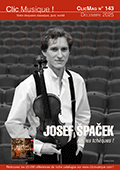 Edward MacDowell, compositeur américain formé aux Etats-Unis, en France et en Allemagne compose une musique essentiellement pianistique dans la tradition des pianistes virtuoses de la fin du courant Romantique. Elève de Raff qui lui fera rencontrer Liszt on sent immédiatement la filiation avec ce dernier par une écriture pianistique large et orchestrale à la fois poétique et narrative. Sur les quatre sonates composées par MacDowell figurent sur ce disque les deux premières aux titres évocateurs (Tragique et Héroïque) où l’excellent Giorgio Trione-Bartoli à la virtuosité impressionnante crée des atmosphères extrêmement variées en faisant chanter un piano coloré à la sonorité magnifique. Si avec ces deux sonates (qui célèbrent la grande forme), on est proche d’une esthétique lisztienne, on s’en éloigne quelque peu avec les Woodland Sketches, dix pièces beaucoup plus brèves aux caractères variés et intimes que Grieg n’aurait pas reniées, où apparaissent à plusieurs reprises des thèmes typiquement américains. Ce disque est parfait pour découvrir la musique de MacDowell ; les CD de James Barbagallo étant difficilement trouvables, espérons que Giorgio Trione-Bartoli continuera à enregistrer ce répertoire de façon aussi enthousiasmante. (Jean-Noël Regnier)  Edward MacDowell (1860-1908) spent formative years in France and Germany, impressed Liszt and others with his talents as a pianist and composer, and became a respected teacher and composer on his return to the US, dying before he reached 50 after sustaining injuries in a traffic accident and treating the ensuing depression with potassium bromide. As a composer, MacDowell’s most enduring legacy lies in small-scale piano sets such as the Woodland Sketches first published in 1896, where subtle manipulations of harmony, melodic contour and texture take on evocative meaning. MacDowell alternates between dramatic and humourous moods with a Schumann-like rapidity of thought. MacDowell’s four piano sonatas break out of the character-piece mould into epic musical statement, as indicated by their titles: ‘Tragic’ and ‘Heroic’ for the first two. On the one hand, these sonatas are large-scale, impassioned works, steeped in the late Romantic virtuoso tradition; yet at the same time, their projection of stern nobility gives them a curious emotional detachment that mixes uneasily with their expansive idiom. Even in the tremendous First, a homage to MacDowell’s former teacher Joachim Raff, the sorrow is represented rather than expressed. There are few works of the period that are simultaneously so tumultuous and so remote. MacDowell expressed his aesthetic philosophy in words as lofty as his music, which he called ‘a kind of soul-language’. He intended each movement of the “Eroica” to evoke a part of the Arthurian legend, including a spirited scherzo to match the Doré illustration in which the knight of the Round Table is surrounded by elves. Born in 1996, Giorgio Trione Bartoli won many piano competitions in his native Italy before making his career as a performer specialising in Liszt and the central-Romantic repertoire, and as a professor of piano presently based at the conservatoire in Foggia. This release marks his debut on Piano Classics.
 |
